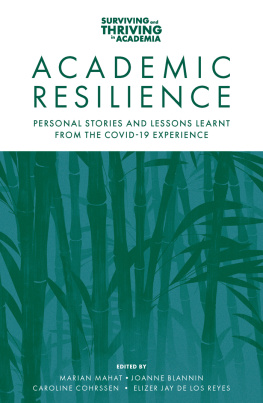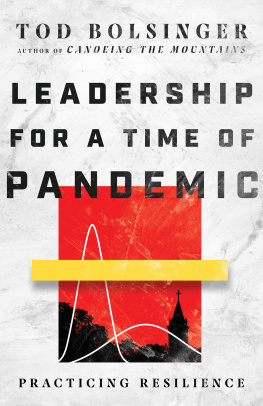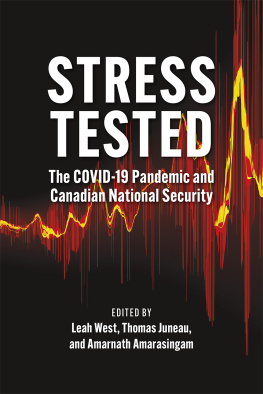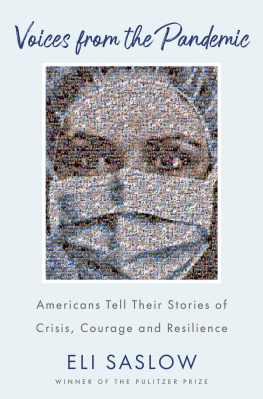1
Academic Resilience: An Uncharted Terrain
Caroline Cohrssen, Joanne Blannin, Marian Mahat and Elizer Jay de los Reyes
Abstract
The pressures brought about by the COVID-19 global pandemic in 2020 have amplified the significance of academic resilience and highlight the importance of a shared insights into academics' experiences. The responses to academic work within this context has received little research attention despite its universality during the pandemic. Failing to recognise, or invisibilising the roles and needs of academics during a pandemic, is a significant concern. This chapter explores this uncharted terrain, and presents stories of resilience being a postdoc in a foreign country (de los Reyes), negotiating (yet another) contract (Mahat), navigating research in a different context (Cohrssen), and digital engagement in academia (Blannin) from academics in different career stages and global contexts. These stories provide points of reflection for those navigating the complex world of academia during these uncertain times.
Keywords: Resilience; higher education; academics; COVID-19; strength; personal growth
Introduction
The COVID-19 pandemic which first emerged on the world stage at the end of 2019 forms the backdrop to this book. It is not the first pandemic of the twenty-first century Severe Acute Respiratory Syndrome (SARS), Swine Flu (H1N1), Middle East Respiratory Syndrome (MERS), and Ebola outbreaks have each been categorised as pandemics (). However, whilst research has addressed the resilience of students and organisations in response to pandemics, we focus on the resilience of academic staff in response to the ongoing demands of living and working in a COVID-19 world.
In the early months of the current pandemic, the individual and collective spirit of many academics was nothing short of extraordinary. As the pandemic continues, its ongoing impact on economic, physical, mental and social well-being means that academics require strategies to sustain their resilience. Such resilience strategies are diverse and have evolved over time. Indeed, as the pandemic continued, short-term strategies became unsustainable. Ongoing long-term strategies required self-reflection and support. One consequence of this responsiveness has been, in some but not all instances, an evolving sense of academic identity; a recalibration of personal priorities and identities; a rebalancing of the core elements of academia: research, teaching, community engagement and knowledge exchange.
Our own narratives are offered in this chapter. Narratives of other academics are generously shared in further chapters in this book. Reflections on a range of challenges and complexities in higher education across multiple academic contexts are offered. Stories and reflections are personal and individual, but when read together, characteristics of resilience emerge that reflect personal attributes, supports accessed to undergird individuals' resilience, and the continued productivity of resilient academics. A strength-based perspective on resilience in academia emerges. This may empower others not only to survive, but to thrive in times of adversity.
An Uncharted Terrain
The Merriam Webster dictionary defines resilience as an ability to recover from or adjust easily to misfortune or change.).
We are mindful of the ideological and discursive consequences of positioning resilience as a characteristic of an individual. Within academia, individualised resilience has been used formally and informally to distinguish those academics who are able to cope from those who find this more difficult. It may contribute to perceptions of those who are successful versus those who are not. Put simply, resilience has been romanticised as the elixir of an academic's success that ignores structural accountability ( notions of resilience may have bolstered deficit-oriented discourses. This is not our intent. Rather, by defining resilience in a way that brings together optimism, perseverance, competence, creativity and adaptability (inter alia) with institutional qualities such as social and economic resources, support, management and care, we attempt to ensure that individual agency is not misrecognised, and that institutions are not absolved from their accountability. We argue that when higher educational institutions fall short in fulfilling their mandate to provide support to their staff, individual academics are quick to fill these gaps, at times at their own expense. This book does not romanticise the resilience of academics, yet its chapters reveal inspiring examples of resilience and growth. At times these are achieved with the support of institutions; at others, they are achieved despite the challenges academics have faced.
Stories of Resilience
In this section, we offer several brief narratives from our personal experiences in navigating COVID-19 over the last 18 months. As academics at different career stages and in different contexts, our perspectives vary. Individually the stories bring unique insights into our personal contexts, strengths, challenges and opportunities. Collectively, they bring a strength-based perspective on academic resilience, that we hope may empower others during periods of adversity.
A Postdoc in a Foreign Country Elizer Jay de los Reyes
Whilst attending university in the Philippines 15 years ago, I was evicted from my accommodation for failing to pay rent for several months. I was homeless and was moving from one friend's place to another every week until I graduated. I was living on 40 Php (1.08 AUD; 0.84 USD) per week from my parents who were selling fish and meat in the village market and struggling to pay loans. I finished university at the age of 20. I was immediately employed as a high school teacher, sent my siblings to university, secured a Fulbright for graduate school in the US, and eventually, was awarded another international research scholarship to undertake my PhD at The University of Melbourne. Fast forward to late 2019: a matter of months before submitting my PhD thesis, I received two offers from the National University of Singapore both starting in January 2020. I thought that accepting either of them while waiting for my thesis to be examined would be good. Fortunately, I was allowed to combine the two contracts for a longer stay at the National University of Singapore.
On 23 January 2020, I arrived in Singapore with so much optimism! On my first day, I reported to my department, met with Human Resources and met my supervisor. On the same day, the first confirmed case of infection in Singapore was announced. On 1 February 2020, we were advised by the government to wear masks when unwell and visiting a doctor. On 7 February, the government deemed the situation to be severe but stated that whilst the virus can spread easily, it had not spread widely and was being contained. By March, safe-distancing measures were in place; temperature checks and health declarations were required. On 7 April, a circuit breaker lockdown commenced. This meant that I could no longer go to my office to work. I could not meet anyone outside my household. I could not go to the gym for my workout. My housemates, who like me were also Visiting Research Fellows, were stuck in Malaysia as coming back to Singapore was impossible. Only a matter of weeks before the circuit breaker, I had been working at my office, revising a book chapter and writing a book proposal. I had also received my PhD thesis examination results and was working on minor revisions. I was going to the gym every day. Suddenly, I was alone in a huge three-bedroomed apartment, with nowhere to go except the grocery store, a nearby park, or the hospital if I became ill.
My story of resilience is not as ghastly as other academics who were faced with unimaginable hurdles at the onset and during the pandemic. My story is mostly about my sense of gratitude and acknowledging the privileges of my situation. Put simply, the adversities that I was facing at the outset and during the height of the pandemic were not even half as challenging as the adversities I had faced earlier in my life. I did not have to pay rent. The fear of being evicted was remote. I did not have to stretch little more than one dollar to survive for a week. My parents were no longer struggling to pay big loans. My concerns were how an office person like me could sustain my writing given that I was prevented from entering my workplace, how I could maintain my exercise regimen given that gyms were closed, and how I could maintain connections with people that mattered to me. At the time of writing, I missed chatting with my new friends at breakfast as we had to pick up food in boxes from the lounge. I missed slaying a 45-minute High Intensity Interval Training with my favourite coach and gym buddies now that I have to do five-kilometre runs for 30 minutes alone in a nearby park just to meet my 1,200 kilojoule target. I missed the feel of being in the office now that I must work at home where I am not interrupted by the banging of automatic doors. I missed the casual conversations in the office pantry. I missed the smell of my surroundings now that I must wear a mask.






